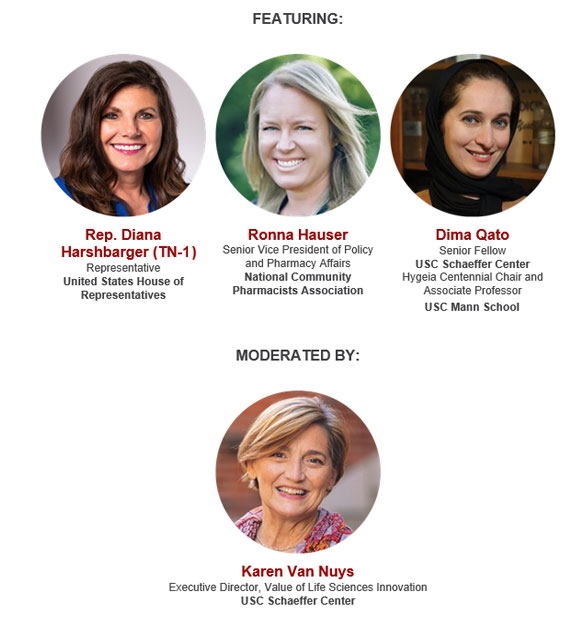Wednesday, April 12, 2023
12:00 PM – 12:45 PM Pacific
From administering vaccines to prescribing contraceptives and dispensing naloxone for the prevention of a fatal overdose, pharmacies play a vital role in community wellbeing. Yet, nearly one in four U.S. neighborhoods lack convenient access to pharmacies, and hundreds of pharmacies close their doors every year. Pharmacy deserts contribute to persistent racial and ethnic health disparities.
Why is this happening and what can be done to ensure access to pharmacy services? For answers, please sit in on a conversation by a distinguished panel: U.S. Representative Diana Harshbarger (TN-1), who has been a licensed pharmacist since 1987; Ronna Hauser, PharmD, senior vice president of policy and pharmacy affairs at the National Community Pharmacists Association; and Dima Qato, senior fellow at the USC Schaeffer Center. Karen Van Nuys, executive director of the Value of Life Sciences Innovation research program at the Schaeffer Center, will moderate this timely discussion.
This webinar is hosted by the USC Schaeffer Center for Health Policy & Economics, the USC Mann School of Pharmacy & Pharmaceutical Sciences, and the USC Price School of Public Policy.
This event will be live closed captioned, in some instances using AI technologies, and therefore may not be fully accurate. Upon request, a full transcript is available after the event. Every reasonable effort will be made to provide reasonable accommodations in an effective and timely manner.

Representative Diana Harshbarger
A native East Tennessean, Congresswoman Diana Harshbarger was born in Bloomingdale, a small community right outside of Kingsport, and was the first in her immediate family to graduate from high school and college. Although her parents did not have the opportunity to further their education, they taught Diana the value of hard work at a young age. She attended East Tennessee State University and graduated from Mercer University College of Pharmacy with a Doctor of Pharmacy degree. After graduation, she returned home to start a business and raise her family.
Diana has been a licensed pharmacist and a successful business owner for over three decades. She brings a no-nonsense, common-sense approach to Washington D.C. Diana is dedicated to fighting for East Tennessee’s priorities, including healthcare reform, economic development, combating the tragic opioid epidemic, and expanding broadband access for rural communities. She currently serves on the House Committee on Energy and Commerce.
Diana is an active member of her Kingsport community, teaching Sunday school, helping with her church’s mission work and other local non-profits. Further, she is a member of the local Chamber of Commerce and a former board member of the International Academy of Compounding Pharmacists.
Diana and her husband, Robert, currently reside in Kingsport when they are not at their farm in Unicoi. Diana has one son and two grandsons.
Ronna B. Hauser, PharmD
Ronna B. Hauser, PharmD, is the Senior Vice President of Policy & Pharmacy Affairs for the National Community Pharmacists Association (NCPA). In this capacity Ronna is responsible for the association’s professional affairs, public policy and regulatory initiatives, including legislative review and drafting, the preparation of regulatory comments, issue briefs, testimony, and correspondence. Ronna represents and presents on behalf of NCPA at governmental and private sector meetings and is the lead for relationships and outreach to multiple non-profit organizations and federal and state agencies such as FDA, CMS, DEA, and DHA (Defense Health Agency).
Prior to joining NCPA in 2009, Ronna was the Director of Pharmacy Advocacy and Policy at the National Association of Chain Drug Stores, where she advocated the value of pharmacy to federal and state legislators, regulators, and other policymakers. She has also worked as a licensed community pharmacist. She has 20 years of progressively responsible experience in association management, policy development, regulatory law, pharmacy practice and operations, strategic relationship building and fundraising.
Ronna is an experienced manager and has led teams and committees and frequently presents to audiences large and small. She has served on the Board of Directors of the Pharmacy Quality Alliance (PQA) and was responsible for NCPA’s role in creation of the Pharmacy e-Health Information Technology Collaborative. She helped create and shape NCPA’s LTC Division, and remains engaged in policy and regulatory issues impacting long-term care pharmacy.
Ronna has a bachelor of science in biomedical science from Texas A&M University and a Doctor of Pharmacy from the University of Texas at Austin College of Pharmacy.
Dima Mazen Qato, PharmD, MPH, PhD
Dima Mazen Qato, PharmD, MPH, PhD serves as the Hygeia Centennial Chair and Associate Professor (with tenure) in the Titus Family Department of Clinical Pharmacy. She has also been appointed as a Senior Fellow with the USC Leonard D. Schaeffer Center for Health Policy and Economics. Dr. Qato is currently leading the Program on Medicines and Public Health within the Titus Family Department of Clinical Pharmacy at USC.
Prior to joining USC, Dr. Qato was an Associate Professor in the Department of Pharmacy Systems, Outcomes and Policy at the University of Illinois at Chicago College of Pharmacy (2012-2020). She also serves as a National Academy of Medicine Pharmacy Fellow for 2018-2020. Dr. Qato received her PharmD from UIC, an MPH from the Johns Hopkins School of Public Health and a PhD in Public Health from the University of Illinois School of Public Health.
At the USC School of Pharmacy, she will develop and lead interdisciplinary research efforts focusing on drug utilization, access to medicines, and pharmaceutical policy both in the U.S. and globally to better understand why medications are used, or not used, and how they can and should be used in the population to promote equity, longevity and good health.
Dr. Qato’s research utilizes population-based methods to better understand the underlying mechanisms responsible for the use, underuse and unsafe use of medications, how these patterns may influence health outcomes and health disparities, and what can be done from a community and policy perspective to address these growing public health problems. Dr. Qato’s goal is to promote public accountability to better ensure access to, and safe use of, medications at the national, state and local levels. In an effort to achieve this goal, Dr. Qato is interested in incorporating the concept of ‘essential medicines’ in payment and regulatory decision-making in ongoing health care reform.
Karen Van Nuys, PhD
Karen Van Nuys, PhD, is the executive director of the Value of Life Sciences Innovation program and a fellow at the USC Schaeffer Center. She is also a research assistant professor at the USC Price School of Public Policy. Her recent research focuses on the social value of novel therapies for heart failure and hepatitis C, the flow of funds in the pharmaceutical distribution chain, and the impact of commercial practices such as copay coupons and copay clawbacks on the utilization and cost of prescription drugs. Her work has been published in leading journals in economics, medicine, finance and health policy.
She has held positions across both industry and academia, including as principal and priority service offering director at Booz Allen Hamilton, senior research economist at Precision Health Economics, national fellow at the Hoover Institution and an assistant professor at the Simon School of Business at the University of Rochester. She has consulted with Fortune 50 companies ranging from insurance providers and life sciences companies to automotive manufacturers and media conglomerates. She received her PhD in economics from Stanford University, and her MA and BA degrees from the University of California, San Diego.
- Event Date
- Wednesday, April 12, 2023
12:00 PM - 12:45 PM Pacific - Location




You must be logged in to post a comment.